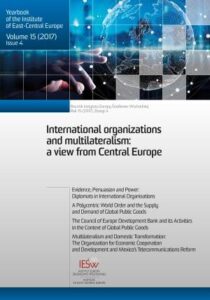Pages: 103-117
Edition: Lublin 2017
DOI: --
Citation method: T. Cullinan, ‘Multilateral Sanctions on North Korea and the Role of Central Europe’, Year-book of the Institute of East-Central Europe, Vol. 15, No. 4, 2017, pp. 103-117.
Abstract: The expansion of North Korea’s nuclear and ballistic missile pro-grams, coupled with belligerent rhetoric, has raised tensions between North Korea and the international community to unprecedented levels. Sanctions are the best tool to respond to North Korea and can be applied to coerce a change in behavior that would bring about the resumption of negotia-tions between stakeholders. The United Nations Security Council (UNSC) has adopted sanctions resolutions that highlight the shared interest of stability and security, and signal the need to find a political solution. A multilateral response will disrupt North Korea’s ability to use provocations to seek con-cessions. Central European countries’ participation in the United Nations (UN) system and their cooperation to implement sanctions will play a vital role in achieving this goal. Increasing sanctions compliance and applying pressure on the North Korean regime will create space for negotiations between stake-holders and North Korea, which could achieve a peaceful political solution.

PDF: Download